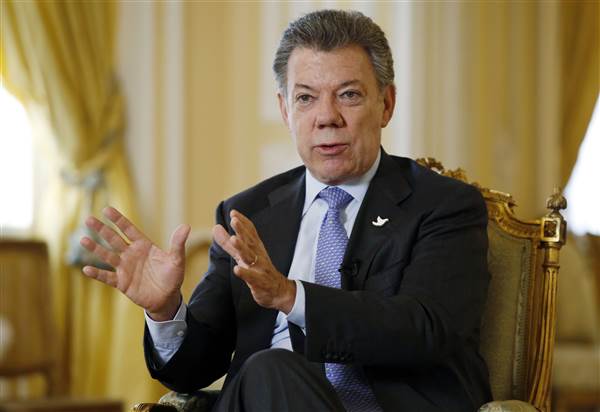
President Juan Manuel Santos is asking the United States to remove the Revolutionary Armed Forces of Colombia from its list of terrorist organizations to help him seal a peace deal with Latin America’s oldest leftist insurgency.
In an interview days before a key visit to the White House, Santos made his most-sweeping call for action, also calling to suspend drug warrants against guerrilla commanders from Washington. His Feb. 4 meeting with President Barack Obama will celebrate 15 years and some $10 billion in U.S. counterinsurgency and anti-narcotics aid to its staunchest ally in the region.
The meeting will also underscore Colombia’s historic moment: the peace talks taking place in Cuba have reached what both sides describe as a point of no return, with a final deal to end a half-century of bloodshed expected as early as March. This week the U.N. Security Council unanimously endorsed sending a mission to monitor an eventual accord, handing Santos a diplomatic victory as he tries to drum up funding for what he said will be a 10- to 15-year effort to recover vast parts of the country he says had been ceded by the state to illegal armed groups.

When a deal is inked, Santos said it would be appropriate for the Obama administration to strike the FARC from a State Department list of terrorist organizations it has been on for almost two decades alongside such groups as al-Qaida and the Islamic State. The FARC, which as part of peace talks has already renounced kidnapping and declared a unilateral truce, has long demanded it be excluded.
“If they sign it’s because we have a timetable for their disarmament and they have committed themselves to lay down their arms and make this transition to legal life. So I would say yes, I hope that they would be eliminated from the terror list,” Santos said Thursday at the presidential palace.
When pressed about how soon after the accord is inked should the FARC be removed, Santos said the “the shorter the better.” A Colombian paramilitary umbrella group had to wait a full six years after it completely disarmed to be removed.
In the same vein, he said he would like to see the U.S. follow his lead in Colombia and suspend arrest warrants targeting the FARC’s top leadership, many of whom are negotiating in Havana. U.S. federal prosecutors in a 2006 indictment accused 50 FARC leaders of supplying more than half of the world’s cocaine, claims that Santos said were exaggerated and in any case out of sync with commitments made at the negotiating table to abandon its involvement in the drug trade and help the government eradicate cocaine crops.
“Any effort by the United States to allow us to apply transitional justice, for example by suspending the arrest warrants, would help us tremendously,” he said.
Coca production skyrocketed 39 percent in 2014 and many experts say it will climb even further after Santos last year halted a U.S.-backed aerial eradication campaign over health concerns.
He likened the FARC’s charging of a war tax on cocaine moving through territory it dominates to tactics used by the Irish Republican Army in its fight with Britain.
“The way the IRA was robbing banks, the guerrillas were financing themselves from drug-trafficking,” he said.
But he warned that if guerrillas continue to enrich themselves through drugs all bets are off.
“Let’s be very clear: if they don’t behave, they’ll be extradited,” he said.
U.S. officials have long insisted that only prosecutors can suspend the warrants. Justice Department spokesman Peter Carr declined to comment on Thursday.
Santos, a former defense and finance minister and the scion of the family that founded Colombia’s largest newspaper, described Colombia’s evolution from a near failed state when Plan Colombia began under President Bill Clinton into one of world’s fastest-growing emerging markets with lower levels of conflict-linked violence.
[Source:- nbcnews]

